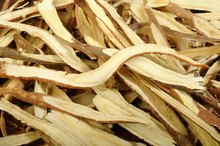The Side Effects of Psyllium Husk
Psyllium husk is derived from the Plantago ovata plant. Since psyllium husk naturally contains dietary fiber, it is used in several fiber and laxative supplements to treat constipation and promote bowel regularity, notes MedlinePlus. It can also be used to treat diarrhea and lower cholesterol levels. Although psyllium husk is normally safe, side effects may develop in some people.
Medical Absorption
Psyllium husk can possibly interfere with medication absorption, notes the University of Maryland Medical Center (UMMC). Medications it can potentially affect include tricyclic antidepressants, digoxin, bile acid sequestrants and carbemazepine. Consult with your physician before using psyllium husk products.
Gas and Bloating
Metamucil & Bloating
Learn More
Bloating or a full feeling in your abdominal cavity are potential side effects associated with psyllium husk, notes the UMMC. Gas and increased flatulence often occur when using psyllium products. If bloating becomes unbearable or persists, talk with your doctor about alternatives to remedy your condition.
Obstruction
Taking laxatives containing psyllium husk can cause obstructions or blockages in the gastrointestinal tract. This effect is most common if you have failed to properly mix the psyllium husk with water or have undergone bowel surgery, reports MedlinePlus. Since the risk of developing a gastrointestinal obstruction can occur, do not use psyllium husk products if you have throat conditions or swallowing difficulties, as improperly chewed food can become lodged in your digestive tract.
Allergic Reactions
Side Effects of Glucomannan
Learn More
Severe allergic reactions, such as anaphylaxis, are a reported side effect of taking psyllium. Possible signs of allergic reactions include vomiting, chest tightness, breathing difficulties, rashes and hives. As a safety measure, report any of these symptoms to your physician, states Drugs.com.
Related Articles
References
- UMMC: Psyllium
- MedlinePlus: Psyllium
- Drugs.com: Psyllium Side Effects
- Xiao Z, Chen H, Zhang Y, et al. The effect of psyllium consumption on weight, body mass index, lipid profile, and glucose metabolism in diabetic patients: A systematic review and dose-response meta-analysis of randomized controlled trials. Phytother Res. 2020. doi:10.1002/ptr.6609
- Anderson JW, Allgood LD, Lawrence A, et al. Cholesterol-lowering effects of psyllium intake adjunctive to diet therapy in men and women with hypercholesterolemia: a meta-analysis of 8 controlled trials. Am J Clin Nutr 2000;71:472-479.
- deBock M, Derraik JGB, Brennan CM et al. Psyllium supplementation in adolescents improves fat distribution and lipid profile: a randomized, participant-blinding, placebo-controlled, crossover trial. PLoS One 2012;7:e41735.
- Ribas SA, Cunha DB, Sichieri R et al. Effects of psyllium on LDL cholesterol concentrations in Brazilian children and adolescents: a randomized, parallel clinical trial. Br J Nutr 2015;113:134-141.
- Van Rosendaal GMA, Shaffer EA, Edwards EL, et al. Effect of time of administration on cholesterol-lowering by psyllium: a randomized cross-over study in normocholesterolemic or slightly hypercholesterolemic subjects. Nutr J 2004;3:1-7.
- Wei W, Wang H, Chen XY et al. Time and dose-dependent effect of psyllium on serum lipids in mild to moderate hypercholesterolemia: a meta-analysis of controlled clinical trials. Eur J Clin Nutr 2009;63:821-827.
Writer Bio
Kelly Taylor has been writing since 2000. She has written for the "Advocate," "HealthCare Daily" and other magazines. She holds a Master of Science in nursing from Louisiana State University.









